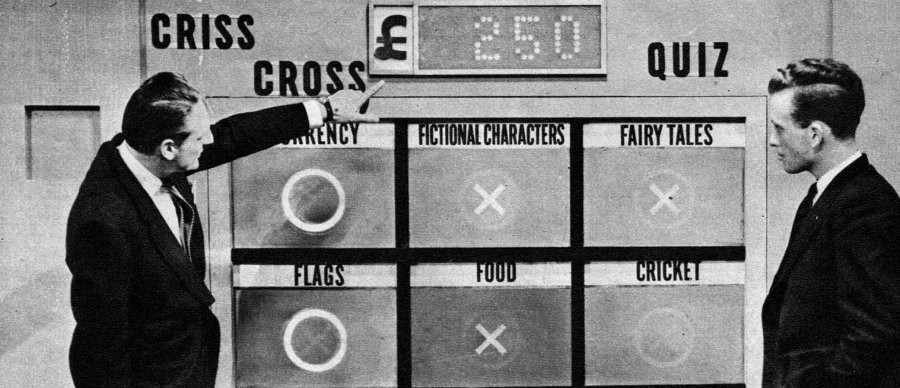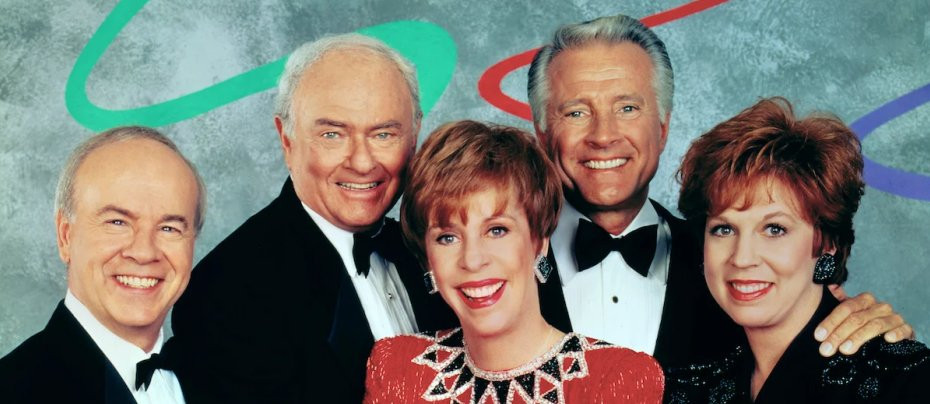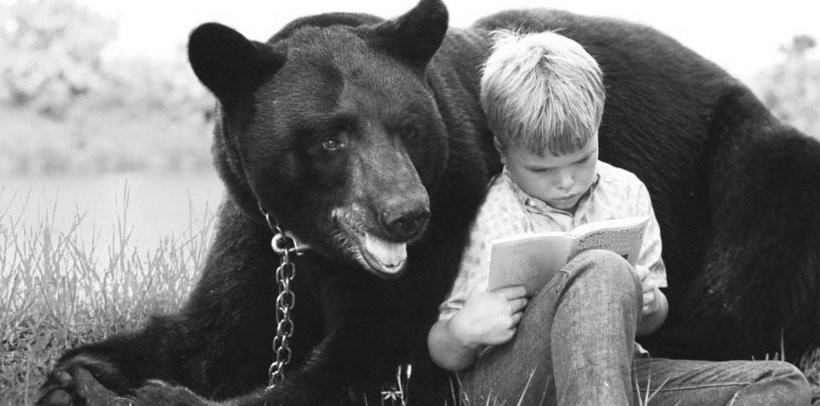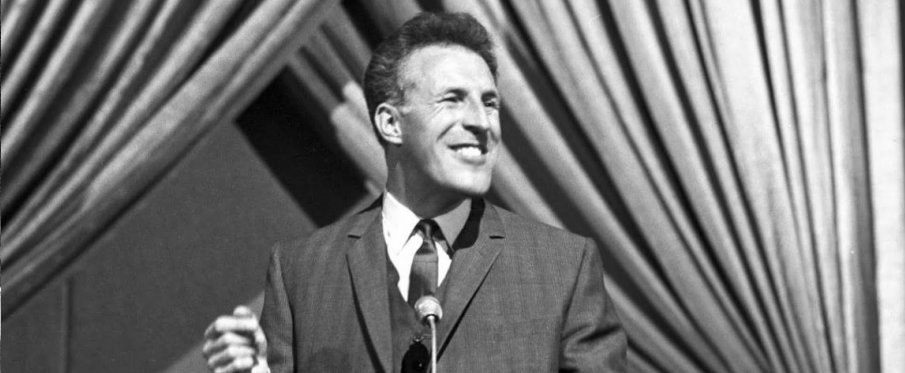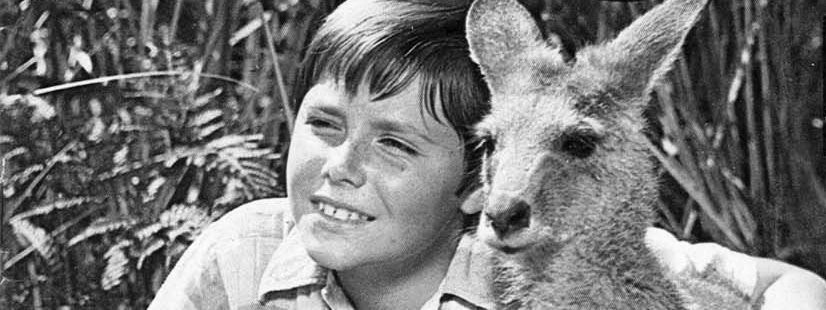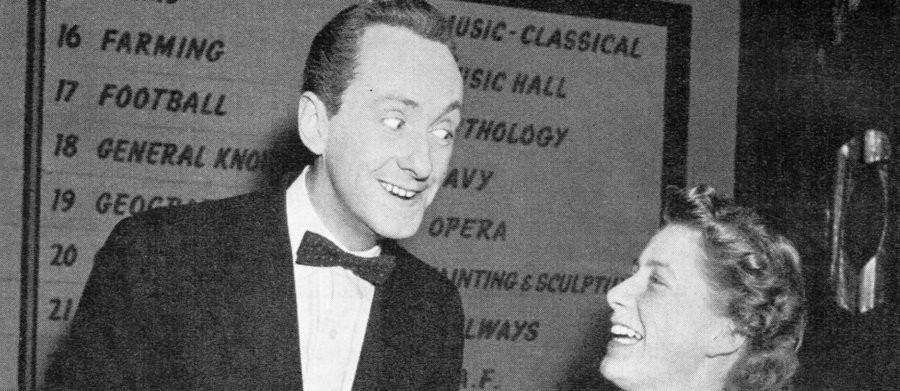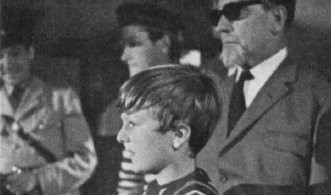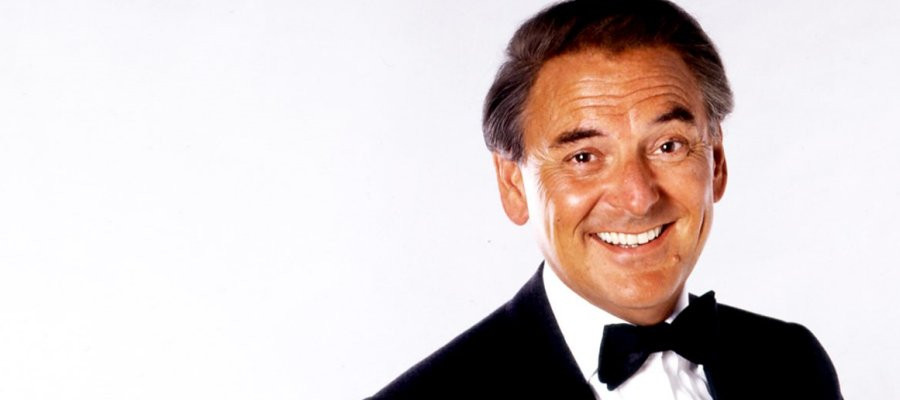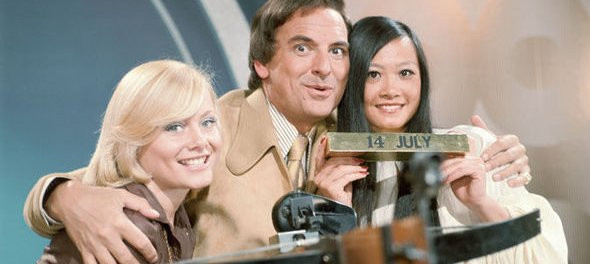
The Golden Shot
1967 - United KingdomPromoted by ATV as "the liveliest live show ever!", The Golden Shot debuted on Saturday 1 July 1967 at 8.54 across all the ITV networks (necessary as the show went out live). After seeing that first show, one critic responded, "this is the deadest dead duck ever".
The Golden Shot began life in Germany as Der Goldener Schuss and was devised by friends Hannes Schmid and Werner Schmid who also supplied their specialised equipment. The idea for the show was inspired by an encounter that Hannes had whilst working on American television. "I was on the studio floor and there were balloons hanging in the studio. While I relaxed next to one of the cameras, am an called Kansas Joe handed me a Colt .45. I was resting this gun on the camera, when over the earphones the technical director asked: 'What have you got in your hand?"
'It's a gun,' I told him. 'Why?'
Then he said to the cameraman: 'Close your eyes and follow my instructions' which is what the cameraman did. 'Move to the left a little-no, to the right more. That's it. Now shoot at the balloon.'
As far as everyone else was concerned it was just an amusing little incident. But I could hardly contain my excitement because an idea had suddenly struck me."
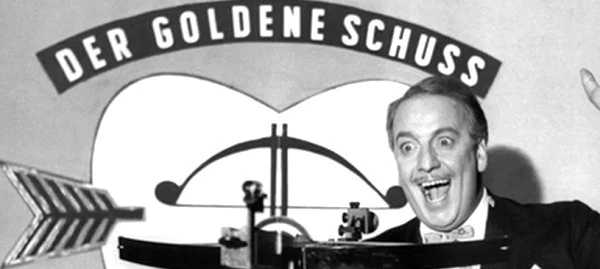
Developing the idea further and perhaps with a little inspiration from the legend of William Tell, shooting an arrow from a crossbow aimed at an apple perched upon his son's head, Hannes and Werner toiled on the idea until they came up with a workable format.
Contestants were selected from home viewers and the studio audience. The object was to guide a blindfold cameraman on a 'tele-bow' instructing him to point the camera "up...down...left...right" before giving the instruction to "fire!" Home viewers would give the instructions over the telephone whilst sitting in front of their TV screens (hence the necessity for the live broadcast), whilst studio contestants were placed in a booth with a monitor.
Each contestant had 30 seconds to line up their target and give the order to fire at the apple. The top four marksmen were invited to compete against each other the following week. The next week the show was split into three sections: Using the free-standing cross-bow to shoot at a moving or stationary target. The top two shooters would battle it out using a joystick placed in front of a monitor to guide the tele-bow. In the final segment one contestant would get a chance to win the jackpot by taking direct control of the tele-bow in order to sever a thread holding a bag of gold 'coins'.
The starting prize was 100 guineas (a guinea being the equivalent of £1.05 in today's money), and increased each week unless won until it reached a maximum of 900 guineas, after which it would be reset. Each bow cost £150 and built up a pressure of 500lb for the firing of the bolt. The bolts were four-inches long and steel tipped. The targets were made out of wood of three-quarters of an inch thick and the bolts embedded themselves in up to half an inch.
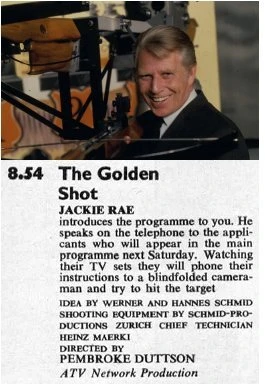
The series was hosted by Jackie Rae, a Canadian singer, songwriter and television performer. During the 1950s, he was the host of The Jackie Rae Show, a variety show on CBC Television in America. Lew Grade, the head of ATV who had purchased the British rights for the show, chose Rae after seeing him play a quiz show host on a Charlie Drake show.
British scriptwriter and comedian Bob Monkhouse had been hoping to get The Golden Shot gig. In his autobiography Crying With Laughter, Monkhouse wrote that after watching the first show he found it to be completely lacking in humour or excitement and although the central idea was excellent the plodding procedure of the game completely failed to impress him. He was not alone. Viewers switched channels in their millions and the ratings plunged. It seemed as though The Golden Shot had shot its bolt and was on the verge of being cancelled.
After the first nine shows Bob Monkhouse was invited to appear as a guest, but was reluctant to give up a lucrative engagement elsewhere. However, his agent's suggestion that this might give him a chance to show ATV 'a thing or two' proved to be all the persuasion he needed. He looked at the script he'd been given for his appearance on the show and completely rewrote it. He also convinced the props men to come up with some new target designs that he'd drawn (Monkhouse was an excellent cartoonist). After seeing a recording of Monkhouse's appearance and the studio audience reaction to him, Lew Grade got in touch with his agent and offered Bob the job: As host. Monkhouse readily accepted and became the highest paid quiz-show host on television, being paid £750 per episode. But he was so much more than mere presenter.
He completely revamped the show's format, trimmed down some of the sections, wrote the scripts and designed the targets.
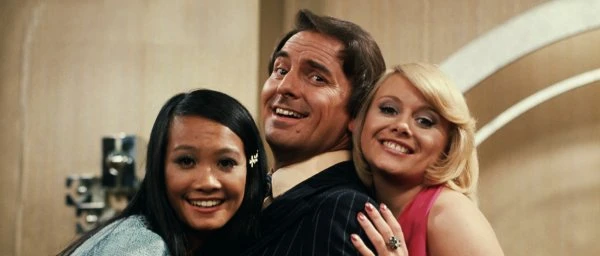
Bob Monkhouse presented his first Golden Shot on 7 October 1967. Within five weeks it increased its rating by 50%. He had replaced the man who placed the bolts in the crossbows following the command "Heinz, the bolt" with Derek Young and with a simple change of name to "Bernie, the bolt" a national catchphrase was born.
The original 'Golden Girls' were removed (apart from Carol Dilworth) and the show continued to rise in popularity. Headlines appeared in the press along the lines of 'A Bolt Out of the Blue', 'Golden Shot Bobs Up' and 'On Target at Last.' The show that was on the verge of cancellation a few weeks before enjoyed a 56 week continuous run before taking a break on 28 July 1968.
When it returned on 12 January 1969 in its regular Sunday afternoon slot (it had been moved in January 1968 to boost Sunday afternoon ratings across the ITV network), Bob introduced a new Golden Girl; Anne Aston. "I read an article saying that The Golden Shot was moving from London to Birmingham, so I wrote to them asking for a job," Said Aston. "After sending off a photograph of me in an evening dress with my hair all done up, they invited me to audition with 100 other women and I got chosen. I did my first live show in 1969. I went across to the target board with my microphone to add up; the audience could hear me and when I turned round they burst out laughing. I thought, 'I've got the sack.' But the director said, 'That was great, keep it in!' I got known for getting my sums wrong and after a few weeks, someone said that 16 million people were watching and my mind went blank."
The Golden Shot continued to be a ratings winner until 1972 when an off-the-screen incident cost Monkhouse his job as host. Monkhouse was spotted accepting a gift from advertising agency executive Bob Brooksby who was working with Wilkinson Sword to launch a new razor. The following week, a Wilkinson Sword "his and hers" grooming kit was one of the prizes on the show. Despite Bob's innocence, ATV's production controller Francis Essex suspected collusion and fired Monkhouse, although publicly it was announced that he was being released to "find opportunities for his abilities elsewhere". The Golden Shot got a new host.
Norman Vaughan had previously presented Sunday Night at the London Palladium. Although used to live appearances he had little experience of working at the frantic pace that The Golden Shot required. It soon became apparent to Vaughan that he'd made a mistake accepting the job as host, but ATV refused to let him out of his contract. But with the ratings dipping dramatically it became clear that something had to change. Eventually ATV replaced Norman Vaughan with stand-up comedian Charlie Williams. If Norman Vaughan was out of his depth then Charlie Williams was like a body that had been thrown into the river with a concrete block tied to his feet. Williams lasted six months on the show.
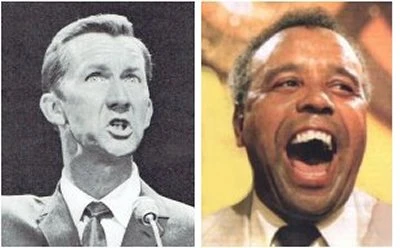
On 20 March 1974, ATV approached Bob Monkhouse once again to host The Golden Shot and he readily agreed, although his agent negotiated a deal whereby Monkhouse would only return if ATV took up an option on the US gameshow Hollywood Squares with Monkhouse as host.
The Golden Shot returned for its sixth and final series on 14 July 1974. Joining Bob as host were Anne Aston and another Golden Girl, Wei Wei Wong (main picture). Once again it climbed the ratings and the series ran nonstop for the rest of 1974 up until its natural end. Its final edition was broadcast on 16 March 1975. Norman Vaughan and Charlie Williams joined Bob Monkhouse to give the show a final send-off.
The Golden Shot was the perfect example of the right face in the right place. As much as The Generation Game's success was originally down to the personality and presenting skills of Bruce Forsyth and Saturday Night Takeaway is down to the chemistry of Ant and Dec, so The Golden Shot was the ideal vehicle for one of British television's most prolific stars. And when it delivered-as far as the British public were concerned-it was bang on target.
Seen this show? How do you rate it?
Seen this show? How do you rate it?
Published on February 5th, 2019. Written by Laurence Marcus 2015 (Sources: TV Times-various editions, Crying With Laughter by Bob Monkhouse) for Television Heaven.


